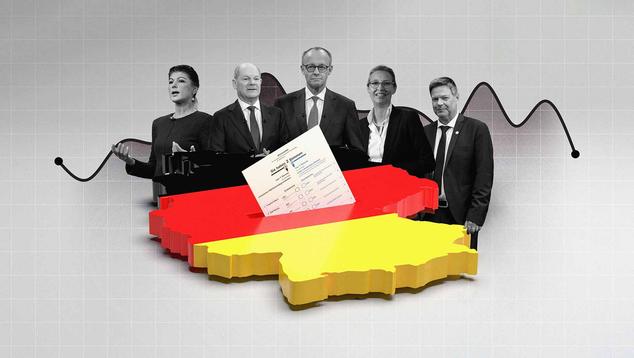LONDON -- Germans head to the polls later this month, with the federal election coming at a pivotal time for the country, both domestically and abroad.
Gallup trends identify five key issues awaiting Germany’s next chancellor, who -- according to recent polls -- is not likely to be the incumbent, Olaf Scholz. The Christian Democratic Union (CDU), led by Friedrich Merz, is currently the front-runner.
1. Boost Economic Growth to Raise Living Standards
After two years of no significant economic growth, Germans are more pessimistic about their living standards now than at any time since the financial crisis in 2008. The percentage who say their situation is improving dropped sharply from 42% in 2023 to 27% in 2024.
Germans’ poor expectations align with gloomy expert forecasts for Europe’s biggest economy. According to the European Commission, Germany’s economy -- the traditional engine of the wider EU economy -- is projected to be the bloc’s weakest performer in 2025.
The evaluation by Germans in 2024 earns them a spot among the least optimistic in the EU, along with Austria (30%), Bulgaria (27%), Greece (27%) and France (24%).
Germany’s economy was badly exposed to the energy price shock after Russia’s invasion of Ukraine, and a slowdown in its once-formidable industrial sector has led to significant job losses in famous German companies. The U.S. recently became Germany’s biggest single-country trading partner, but if President Donald Trump follows through on his tariff threats, it could further unsettle German consumers.
2. Combat German Housing Crisis
For the first time since 2006, Germans are evenly split between being satisfied (47%) with the availability of good, affordable housing in their local area and being dissatisfied (46%). Dissatisfaction with affordable housing has risen gradually for the past 15 years.
Germany’s housing crisis reflects a broader trend across advanced economies. Among OECD nations, a median of 43% express satisfaction, while 50% are dissatisfied. However, Germany’s decline is particularly striking globally. In 2010, 73% of Germans were satisfied, second only to Thailand (86%). Since then, only six other (mostly high-income) countries have seen sharper declines.
There is a severe housing-supply issue in Germany related to high interest rates and construction costs, meaning the government is a long way from meeting its ambitious building targets. Millions live in cramped conditions, with rising competition for housing in major cities pushing up prices.
3. Rebuild Public Confidence in Government
Strong institutions have been a hallmark of Germany’s stability in recent years. While Germans’ confidence in institutions like the military, judicial system and financial institutions has been steady for the past few years, the same cannot be said for the national government.
Faith in the German government fell to 50% in 2024, its lowest point in over a decade, and down considerably from a high point of 65% in 2020, Angela Merkel’s penultimate year as chancellor. During the last 10 years of Merkel’s tenure, Germany consistently outranked the rest of Europe by double digits for faith in government. Yet recent declines mean that Germans' confidence in their national government is no longer exceptional compared with the rest of Europe.
4. Address Migration Challenges and Public Concerns
Germany has long been an attractive destination for migrants, but the country experienced a significant surge in 2015, amid an influx of migrants and refugees into Europe.
In 2016, Germany scored 7.1 out of 9 on Gallup’s Migrant Acceptance Index, which measures receptivity toward migrants living in one’s country, becoming neighbors, and marrying into families. Higher scores on the index indicate higher acceptance. This score in Germany that year was higher than those for other major European allies, including the U.K. (6.6), France (6.5) and Italy (6.5).
Over time, Germans’ acceptance of migrants has fluctuated, peaking at 7.3 in 2022 but falling back to 6.4 in 2023, lower than in 2016. In contrast, residents in France and Italy felt similarly about migrants in 2023 and 2016, while the U.K. saw an increase to 7.2. Among these major European economies, Germany is the only one in which acceptance of migrants is significantly lower than it was in 2016.
Migration is a pivotal issue in this election cycle. Merkel recently criticized Merz for proposing strict migration policies backed by the far-right Alternative für Deutschland (AfD).
5. Restore Trust and Strengthen Alliances in Europe
The image of German leadership has taken a hit among its European neighbors, as well as at home, in recent years. While majorities across Europe continue to approve of the job performance of Germany’s leadership, there has been a notable decline in approval in the past 12 months, from a median of 60% to 54%.
Five European countries have seen approval ratings for Germany’s leadership fall by at least 10 percentage points since 2023, including Slovenia (-16), Norway (-15) and Finland (-12). No country registered a double-digit increase.
Despite maintaining a 54% approval rating -- consistent with the average over Merkel’s tenure -- Germany’s position has slipped in the past year amid geopolitical uncertainty. With conflicts in Ukraine and the Middle East, political instability in France and potential shifts in U.S. global security policy under Trump, Germany faces mounting challenges as Europe’s dominant power.
Bottom Line
Germany, long a pillar of stability in Europe, is being tested. Perceptions of living standards are at their lowest since 2008, the housing crisis is deepening, public trust in government is fading and attitudes toward migrants have hardened. Meanwhile, Germany’s standing in Europe is slipping at a time of significant global and regional turmoil. The next chancellor will inherit a nation grappling with both internal and external uncertainty.
To stay up to date with the latest Gallup News insights and updates, follow us on X @Gallup.
For complete methodology and specific survey dates, please review Gallup's Country Data Set details.
Learn more about how the Gallup World Poll works.




